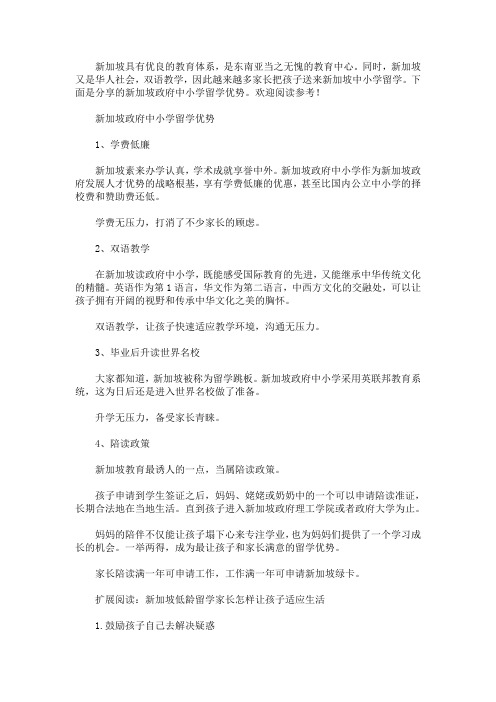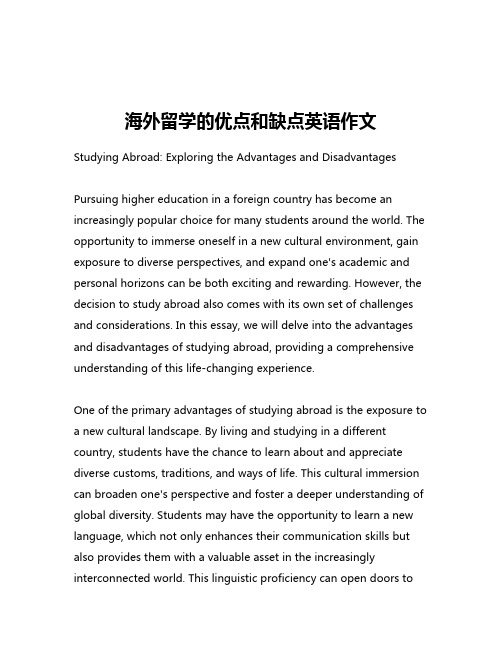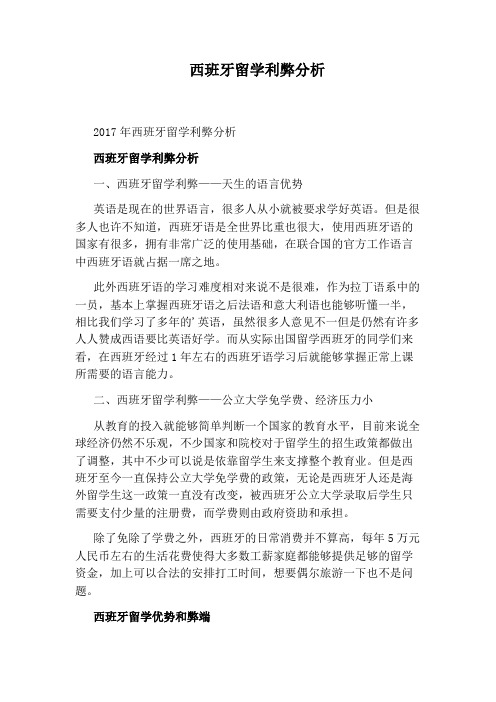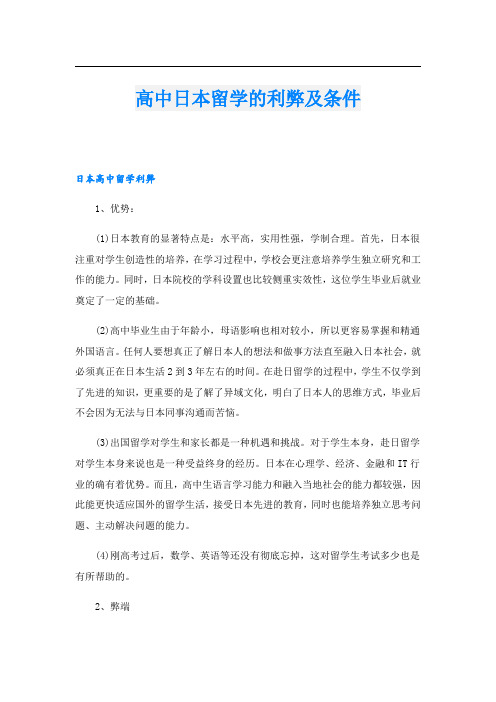各国留学优缺点
德国留学教育优势解读

【导语】德国留学教育资源丰富,教育制度严谨,吸引了⽆数国际学⽣前往德国留学。
下⾯是分享的德国留学教育优势解读。
欢迎阅读参考!德国留学教育优势解读 1.⾼等教育质量过硬 德国的学校和课程⾮常多,⼤约有450所国家认证的学校,其中设置了超过17500种课程,⽆论是想学习各类课程,还是想完成学⼠、硕⼠、还是博⼠学位,基本都能在德国受到相应的教育。
除了提供强⼒科学导向的学习和多种学科种类的⼤学,德国还有倾向于实践的⾼等专科学校和提供多种艺术类课程的艺术学院。
可以说,德国的教育体系能让每⼀个学⽣都学有所获。
2.德国教育⼴受国际化认可,德国⼤学学位拥有良好的声誉 德国的⾼等教育可以说是处在世界⼀流⽔平,⽆论何种专业,尤其是⼯程技术学和⾃然科学领域,都能从德国颇负盛名的教育中获益匪浅。
德国在全世界都是“⾼质量”的别称,这不仅包括了制造⾏业,也包括了教育⾏业,因此,世界各国雇主都⾮常青睐于德国⼤学的学位。
3.留学成本低 ⼤多数德国⼤学都由国家出资来⽀持运营,因此国⽴⼤学的本科专业和多数硕⼠专业通常不需要缴纳学费,只有少数特定的硕⼠专业需要缴纳低廉的学费。
另外德国⽣活成本也较低。
相⽐其它欧洲国家,德国在⾷品、住房、穿着以及其它活动的费⽤都处于平均⽔平,⽽且在多数活动中,学⽣可以使⽤学⽣证享受优惠价格。
留学成本低是某些学⽣选择德国的⼀⼤原因。
4.英语教学 很多⼈拒绝德国的原因是语⾔问题,然⽽⽬前德国已经有越来越多的课程开始使⽤英语授课,尤其是硕⼠课程。
如果没有德语基础,或者德语⽔平不⾜以应对⼤学课程,选择英语授课的专业⽆疑是⼀种的解决⽅式。
5.学习德语 德语是世界上⼴泛使⽤的语⾔之⼀,全球接近2亿⼈掌握了德语。
虽然不会德语也可以正常学习,但是如果想在德国⽣活甚⾄⼯作,德语⼀定是必要的,⽇常⽣活中德语能够帮助你更快交到朋友,融⼊德国社会,⼯作中德语会让简历加分。
6.国际化的学校 德国⼤学的学⽣中,⼤约有12%是来⾃国外的国际学⽣,在德国留学可以结交世界各地的朋友,了解丰富多彩的⽂化,开拓眼界。
在韩留学的中国学生眼中韩国的缺点有那些

在韩留学的中国学生眼中韩国的缺点有那些来看看在韩国留学的中国学生眼中韩国的优缺点各有哪些【韩国留学生眼中韩国的缺点】1.马路上没有垃圾箱。
身上有垃圾只能一直拿着,很不方便。
2.上了年纪的老婆婆大都身体不好,驼背很厉害,一般都90度左右。
而且腿都不直,好像骨头变形。
3.韩国人自大意识泛滥。
“大韩民国”、“大韩航空”等名字比比皆是。
殊不知韩国乃弹丸之地。
4.喝酒的时候礼节繁复。
晚辈要转过身子才能喝。
所以很多人不是喝醉的,是转晕了。
而且,几个人都用同一个杯子。
不卫生。
5.很多餐厅都要脱鞋进去用餐。
6.很多人在公共厕所刷牙,很不卫生。
7.韩国的骄傲——烧酒。
简直就是酒精兑凉水!难喝而且第二天头疼!8.很多地铁站里没有厕所,要打了卡出去才能上厕所!9.公共汽车开的极快,来韩国坐车不晕车的很少!而且,到了车站车不停就开门,很危险,乘客经常是东倒西歪。
10.韩国的几岁的小孩子,大多烫发染发、扎耳洞抹指甲油,那么小对身体有什么好处?11.每天晚上男人都酗酒,喝酒以后在街上撒酒疯!还有的女人也是。
耍酒风也要回家再耍啊。
在外面好看吗?12.街上到处是发小广告的,很烦人。
13.地铁里到处是摆地摊做小买卖的,有碍观瞻。
14.地铁车站口经常有乞丐要钱!车厢里还有推销买东西的。
15.韩国有很多传教的。
走在路上就会遇到,还有直接来家里敲门的,不胜其烦。
}16.韩国人搬到新家都不换锁。
难以理解。
17.出租车费极贵!尤其是晚上12点以后。
有20%的附加税。
18.城市里到处贴的是小广告,电线杆上白花花一片。
19.男卫生间里打扫卫生的阿姨随意出入,横冲直撞,绝不会事先打招呼。
超级尴尬!20.大学里的自习室,占座现象严重!还有人吃住在自习室,缺少道德。
21.城市里野猫成群,靠吃垃圾为生。
一到夜里四处流窜,既脏又讨厌。
22.去医院看病奇贵。
23.所有的阿姨发型完全一样!都是烫的卷卷,千篇一律。
连八九十岁的老太太都不例外。
24.食堂免费供应的小菜大多数韩国人不屑一顾,很少有都吃完的。
新加坡政府中小学留学优势(最新)

新加坡具有优良的教育体系,是东南亚当之无愧的教育中心。
同时,新加坡又是华人社会,双语教学,因此越来越多家长把孩子送来新加坡中小学留学。
下面是分享的新加坡政府中小学留学优势。
欢迎阅读参考!新加坡政府中小学留学优势1、学费低廉新加坡素来办学认真,学术成就享誉中外。
新加坡政府中小学作为新加坡政府发展人才优势的战略根基,享有学费低廉的优惠,甚至比国内公立中小学的择校费和赞助费还低。
学费无压力,打消了不少家长的顾虑。
2、双语教学在新加坡读政府中小学,既能感受国际教育的先进,又能继承中华传统文化的精髓。
英语作为第1语言,华文作为第二语言,中西方文化的交融处,可以让孩子拥有开阔的视野和传承中华文化之美的胸怀。
双语教学,让孩子快速适应教学环境,沟通无压力。
3、毕业后升读世界名校大家都知道,新加坡被称为留学跳板。
新加坡政府中小学采用英联邦教育系统,这为日后还是进入世界名校做了准备。
升学无压力,备受家长青睐。
4、陪读政策新加坡教育最诱人的一点,当属陪读政策。
孩子申请到学生签证之后,妈妈、姥姥或奶奶中的一个可以申请陪读准证,长期合法地在当地生活。
直到孩子进入新加坡政府理工学院或者政府大学为止。
妈妈的陪伴不仅能让孩子塌下心来专注学业,也为妈妈们提供了一个学习成长的机会。
一举两得,成为最让孩子和家长满意的留学优势。
家长陪读满一年可申请工作,工作满一年可申请新加坡绿卡。
扩展阅读:新加坡低龄留学家长怎样让孩子适应生活1.鼓励孩子自己去解决疑惑家长应该鼓励孩子在课程期间或之后向老师弄明白自己的困惑。
孩子可能会觉得在课堂上举手提问是一件十分不好意思的事情,家长就需要告诉孩子,在需要时寻求帮助,是学习过程的一部分,这没有任何不合适的地方。
课堂上参与小组讨论时,小组中的每个人都有不同的看法时,孩子通常会不知所措,这时候家长可以告诉孩子如果他年龄较大,他可以评估问题,并让小组评估每个选项的优缺点,尝试并指导讨论达成共识。
通过这种方式,孩子可以学会良好的辅导和解决问题的能力。
海外留学的优点和缺点英语作文

海外留学的优点和缺点英语作文Studying Abroad: Exploring the Advantages and DisadvantagesPursuing higher education in a foreign country has become an increasingly popular choice for many students around the world. The opportunity to immerse oneself in a new cultural environment, gain exposure to diverse perspectives, and expand one's academic and personal horizons can be both exciting and rewarding. However, the decision to study abroad also comes with its own set of challenges and considerations. In this essay, we will delve into the advantages and disadvantages of studying abroad, providing a comprehensive understanding of this life-changing experience.One of the primary advantages of studying abroad is the exposure to a new cultural landscape. By living and studying in a different country, students have the chance to learn about and appreciate diverse customs, traditions, and ways of life. This cultural immersion can broaden one's perspective and foster a deeper understanding of global diversity. Students may have the opportunity to learn a new language, which not only enhances their communication skills but also provides them with a valuable asset in the increasingly interconnected world. This linguistic proficiency can open doors tofuture career opportunities and personal growth.Furthermore, studying abroad often presents students with the chance to gain a more independent and self-reliant mindset. Living away from the comfort of their home environment requires students to navigate unfamiliar surroundings, manage their own finances, and make decisions independently. This level of autonomy can contribute to the development of essential life skills, such as problem-solving, adaptability, and resilience. These qualities are highly valued by employers and can give students a competitive edge in the job market upon their return.Another significant advantage of studying abroad is the opportunity to expand one's academic and professional horizons. By studying in a foreign institution, students may have access to specialized programs, cutting-edge research facilities, or unique learning opportunities that may not be available in their home countries. This exposure to diverse educational systems and approaches can broaden their academic perspectives and provide them with a more well-rounded education. Additionally, studying abroad can facilitate the establishment of international networks and collaborations, which can be beneficial for future career prospects and research endeavors.However, it is important to acknowledge the potential challengesand disadvantages associated with studying abroad. One of the primary concerns is the financial burden. Studying in a foreign country often comes with higher tuition fees, living expenses, and travel costs, which can be a significant financial strain on students and their families. This financial commitment can be a deterrent for some students, particularly those from underprivileged backgrounds, and may limit the accessibility of overseas education.Another potential disadvantage is the sense of homesickness and cultural shock that students may experience. Adapting to a new environment, language, and social norms can be a daunting and stressful process, especially for those who are far from their support systems. This adjustment period can take a toll on a student's mental health and well-being, potentially affecting their academic performance and overall quality of life.Additionally, studying abroad may present challenges in terms of credit transfer and academic recognition. Navigating the differences in educational systems, grading scales, and degree structures can be complex and may result in difficulties in transferring credits or having one's qualifications recognized upon return to their home country. This can create additional hurdles for students and may prolong the duration of their studies.Furthermore, the experience of studying abroad can lead to thedevelopment of a strong attachment to the host country, which may make it challenging for students to return to their home countries after graduation. This can result in a brain drain, where talented individuals choose to remain in the host country rather than contributing to the development of their home countries.In conclusion, studying abroad is a multifaceted experience that offers both advantages and disadvantages. While the cultural immersion, academic enrichment, and personal growth opportunities can be invaluable, the financial burden, homesickness, and academic recognition challenges must also be carefully considered. Ultimately, the decision to study abroad should be based on a thorough evaluation of one's personal goals, financial resources, and willingness to embrace the unique challenges and rewards of this life-changing experience. By weighing the pros and cons, students can make an informed decision that aligns with their educational and personal aspirations.。
普通家庭出国留学去哪个国家性价比高呢(最新)

普通家庭出国留学去哪个国家性价比高呢?先来看看欧洲各国留学费用一览表单位:元/年法国:公立大学免学费,高等商学院8~12万元/年,生活费6~8万,总费用7~20万德国:公立大学免学费,收取注册费,生活费7~9万,总费用8~10万意大利:公立大学免学费,仅收取少额注册费,生活费4~6万,总费用5~7万荷兰:硕士课程8~14万元/年,生活费6~8万,总费用14~22万欧洲国家1、法国:就读公立大学可免学费法国留学普通家庭也能承担,多数私立院校国际知名,学费便宜,就读公立大学更是可免学费。
法国教育质量一流,专业种类齐全,获得法国学位可直接申请移民法国、加拿大等发达国家。
推荐院校:巴黎一大、巴黎高等美术院校、里昂高商2、德国:一年学费约1万元德国留学相对于其他留学国家的费用低很多,大多数学校的学费收取标准定在每学期400-500欧元之间,1年只需要1万人民币左右即可。
签证率高,无需英语基础便可顺利出国,打工政策非常宽松,毕业就业前景光明,也是欧洲的移民国家。
推荐院校:柏林艺术大学、柏林音乐学院三、意大利资金担保低,可申请政府补贴及高额奖学金到目前为止,意大利大学仍保留原有传统,不将教育作为可以赢利的产业看待,每年都会给国际学生提供高额奖学金。
相比其他欧洲国家,意大利留学费用和生活费用相对便宜,还可申请政府补贴。
留学意大利资金担保低,签证快捷、获签率高。
意大利公立大学是免收学费的,研究生2年,学历也受国内认可,只收取1000-2000欧的注册费。
四、西班牙西班牙,综合来说性价比。
先从大家最关注的费用说起,前几年西班牙的公立对非欧盟学生还是比较友好的,免学费,一年的学分注册费只要八百欧左右。
这两年随着中国留学生的增多以及政府的财政吃紧,很多地区对非欧盟学生征收了较高的学分注册费。
马德里地区甚至一路从1400多欧涨至6000欧!其他地区仍保持1000到2000欧左右的注册费。
但是整体来说学费还是较英美便宜许多,生活费一个月500到600欧足矣。
西班牙留学利弊分析

西班牙留学利弊分析2017年西班牙留学利弊分析西班牙留学利弊分析一、西班牙留学利弊——天生的语言优势英语是现在的世界语言,很多人从小就被要求学好英语。
但是很多人也许不知道,西班牙语是全世界比重也很大,使用西班牙语的国家有很多,拥有非常广泛的使用基础,在联合国的官方工作语言中西班牙语就占据一席之地。
此外西班牙语的学习难度相对来说不是很难,作为拉丁语系中的一员,基本上掌握西班牙语之后法语和意大利语也能够听懂一半,相比我们学习了多年的'英语,虽然很多人意见不一但是仍然有许多人人赞成西语要比英语好学。
而从实际出国留学西班牙的同学们来看,在西班牙经过1年左右的西班牙语学习后就能够掌握正常上课所需要的语言能力。
二、西班牙留学利弊——公立大学免学费、经济压力小从教育的投入就能够简单判断一个国家的教育水平,目前来说全球经济仍然不乐观,不少国家和院校对于留学生的招生政策都做出了调整,其中不少可以说是依靠留学生来支撑整个教育业。
但是西班牙至今一直保持公立大学免学费的政策,无论是西班牙人还是海外留学生这一政策一直没有改变,被西班牙公立大学录取后学生只需要支付少量的注册费,而学费则由政府资助和承担。
除了免除了学费之外,西班牙的日常消费并不算高,每年5万元人民币左右的生活花费使得大多数工薪家庭都能够提供足够的留学资金,加上可以合法的安排打工时间,想要偶尔旅游一下也不是问题。
西班牙留学优势和弊端1、西班牙留学优势(1)学历认可度高西班牙留学是有很多好处的,首先,西班牙这个国家是欧盟高等教育共同体中的国家,如果你在西班牙学习,你所学的课时、科目和拿到的学历会被整个欧洲高等教育共同体所承认;第二,中国和西班牙之间也签署了学历学位互认协议,所以你在西班牙获得的学历学位在中国也被承认。
(2)教育质量高还有,西班牙大学的历史是非常悠久的,而且西班牙大学的教育质量也非常高,学生去西班牙学习不仅仅学习知识,还能了解另一种文化和语言,他们可以在这样的情况下享受一段很好的时光。
海外留学优缺点英语作文

海外留学优缺点英语作文Studying abroad is an increasingly popular option for students seeking to broaden their horizons and gain valuable international experience. Whether it's for a semester, a year, or the entirety ofone's university education, the opportunity to immerse oneself in a foreign culture and educational system can be both exhilarating and challenging. As with any major life decision, there are both advantages and disadvantages to consider when contemplating overseas study.One of the primary benefits of studying abroad is the exposure to a new and different cultural environment. Living and learning in a country with its own unique customs, traditions, and ways of life can be a profoundly eye-opening experience. Students are forced to step outside their comfort zones, adapt to unfamiliar surroundings, and navigate the complexities of a foreign society. This can lead to a greater appreciation for diversity, an increased cultural awareness, and the development of essential cross-cultural communication skills.Moreover, studying abroad often provides students with the chanceto learn or improve a second language. Immersion in the local language, whether it's through coursework, daily interactions, or extracurricular activities, can accelerate language acquisition in ways that traditional classroom settings cannot. The ability to speak a foreign language fluently is not only a valuable asset in the global job market but also enriches one's personal and intellectual growth.In addition to cultural and linguistic benefits, studying abroad can also offer academic advantages. Many international universities and programs provide students with access to specialized courses, cutting-edge research facilities, and renowned faculty members that may not be available at their home institutions. This exposure to diverse educational approaches and perspectives can broaden one's intellectual horizons and challenge students to think critically and creatively.Furthermore, the experience of navigating a foreign educational system can foster greater independence, self-reliance, and problem-solving skills. Students who study abroad are often required to take on more responsibility for their own learning and well-being, which can lead to personal growth and the development of valuable life skills.However, studying abroad is not without its challenges. One of the most significant drawbacks is the financial burden it can place onstudents and their families. Tuition fees, living expenses, and travel costs can quickly add up, making overseas study inaccessible for many. This financial strain can be exacerbated by the uncertainty of securing scholarships or financial aid, which are often limited or highly competitive.Another potential downside of studying abroad is the sense of isolation and homesickness that some students may experience. Being away from family, friends, and familiar surroundings can be emotionally and psychologically taxing, particularly for those who are not well-prepared for the transition. Adjusting to a new cultural environment, navigating bureaucratic processes, and coping with language barriers can also be sources of stress and anxiety.Additionally, there may be academic challenges associated with studying abroad. Differences in teaching styles, grading systems, and educational expectations can be quite jarring for students, leading to difficulties in keeping up with coursework or adapting to new academic demands. In some cases, credits earned abroad may not transfer seamlessly back to one's home institution, potentially delaying graduation or requiring additional coursework.Finally, there is the risk of safety and security concerns. Depending on the political, social, and economic stability of the host country, students may face heightened risks of crime, civil unrest, or naturaldisasters. While most study abroad programs have comprehensive safety protocols in place, the inherent unpredictability of these situations can be a source of worry for both students and their families.Despite these potential drawbacks, the benefits of studying abroad often outweigh the challenges. The personal and professional growth, the cultural enrichment, and the lifelong memories made during this experience can be truly transformative. Ultimately, the decision to study abroad should be carefully considered, weighing the individual's goals, resources, and willingness to embrace the uncertainties and opportunities that come with this endeavor.For those who are able to overcome the obstacles and immerse themselves in a foreign educational setting, the rewards can be immense. The ability to adapt to new environments, communicate across cultures, and develop a global perspective can be invaluable assets in today's increasingly interconnected world. Moreover, the confidence, resilience, and problem-solving skills gained through studying abroad can give students a competitive edge in the job market and throughout their future careers.In conclusion, the pros and cons of studying abroad must be carefully evaluated by each individual student. While the financial, emotional, and academic challenges should not be underestimated,the potential benefits of cultural exposure, language acquisition, and personal growth can be truly transformative. Ultimately, the decision to study abroad is a deeply personal one, but for those who are willing to embrace the adventure, the rewards can be truly life-changing.。
高中日本留学的利弊及条件

高中日本留学的利弊及条件日本高中留学利弊1、优势:(1)日本教育的显著特点是:水平高,实用性强,学制合理。
首先,日本很注重对学生创造性的培养,在学习过程中,学校会更注意培养学生独立研究和工作的能力。
同时,日本院校的学科设置也比较侧重实效性,这位学生毕业后就业奠定了一定的基础。
(2)高中毕业生由于年龄小,母语影响也相对较小,所以更容易掌握和精通外国语言。
任何人要想真正了解日本人的想法和做事方法直至融入日本社会,就必须真正在日本生活2到3年左右的时间。
在赴日留学的过程中,学生不仅学到了先进的知识,更重要的是了解了异域文化,明白了日本人的思维方式,毕业后不会因为无法与日本同事沟通而苦恼。
(3)出国留学对学生和家长都是一种机遇和挑战。
对于学生本身,赴日留学对学生本身来说也是一种受益终身的经历。
日本在心理学、经济、金融和IT行业的确有着优势。
而且,高中生语言学习能力和融入当地社会的能力都较强,因此能更快适应国外的留学生活,接受日本先进的教育,同时也能培养独立思考问题、主动解决问题的能力。
(4)刚高考过后,数学、英语等还没有彻底忘掉,这对留学生考试多少也是有所帮助的。
2、弊端高中生年龄比较小,自控能力较差,人生观尚未成熟,到了一个没有约束的环境,很容易被错误的价值观引导,同时安全也成为很多中国家长担心的问题。
以上的弊端是只要不在父母身边就多少会存在的。
日本高中留学条件初中毕业,而且初中的毕业证必须是被认可的.办理签证,申请签证要二个月左右吧,这项工程父母需要费心了.在就是日本的要求了,这个自己算一算时间,插班还是怎么样.简历提前准备.在就是日本留学的保证金了,数目需要像使馆咨询了,每个阶段是不一样的.你的初中成绩会影响你的入学,但是日本有的学校是比较看重钱的,有钱就能上.日本高中留学一年的费用大概是10元左右了,这也是看个人因素而定的.对于打工!高中生留学日本的条件是高二才可以打工.高中生日本留学费用一、学费1、日本语言学校学习语言课程的费用每年70万日元左右。
- 1、下载文档前请自行甄别文档内容的完整性,平台不提供额外的编辑、内容补充、找答案等附加服务。
- 2、"仅部分预览"的文档,不可在线预览部分如存在完整性等问题,可反馈申请退款(可完整预览的文档不适用该条件!)。
- 3、如文档侵犯您的权益,请联系客服反馈,我们会尽快为您处理(人工客服工作时间:9:00-18:30)。
英国
优势
1学制短:本科3奶奶,大多数硕士1年。
2含金量高:教学质量保持师姐顶尖水平,文凭认可度高。
3英语发源地:体验最正统最地道英语。
4为海外学生提供多种奖学金,帮助完成学业。
对雅思要求:
排名前10大学:本科不低于6.5分,研究生不低于7分。
热门大学及专业
牛津大学 约克大学 兰卡斯特大学 帝国理工大学 杜伦大学 伦敦大学学院 爱丁堡大
学 曼彻斯特大学
金融 商科 传媒类 艺术设计 会计
留学费用:
每年25-30万
美国
优势
1全球顶尖教学质量:世界前100所大学占43所。
2开放的教学环境:注重学生各方面能力挖掘和培养。
3最丰富院校资源:全美总共4000多所大学。
对雅思要求
排名前110大学:本科不低于7分,研究生不低7.5分。
热门大学及专业
普林斯顿大学 哥伦比亚大学 杜克大学 宾夕法尼亚大学 芝加哥大学 斯坦福大学 耶
鲁大学 新媒体 计算机 金融 数据分析 生物工程 电子工程 法律财会 人机互
动
费用:
第一年30-35万 第二年20万(可以自己打工)
澳大利亚
优势
1顶尖教学质量:42所大学,公立40所,私立2所,11所大学排名世界前500,开设从
预科 本科到硕士 博士各级别课程。
2优越移民政策:毕业后可申请移民,享受周薪制高福利。
3学制短:高中2年,大学只需要3年,硕士1-2年。
4学费相对便宜,适合工薪家庭。
5签证成功率高,容易申请名校。
对雅思要求
本科生雅思6-6.5,研究生6.5-7.
热门大学和专业
澳大利亚八大名校:澳大利亚国立大学(QS25 澳研究中心 GPA80 雅6.5) 悉尼大学(37
1850年第一所大学) 墨尔本大学(33 1855研究型) 新南威尔士大学(48 )
莫纳什大学(70
就业全澳第一)
昆士兰大学(43) 西澳大学(89) 阿德莱德大学(106) 蒙纳士大学
商科 IT 传媒类 会计 工程(商业会计 工程仅次于美 英国,位于世界第三)
澳大利亚大学课程可分为六大类,即文科,商业,法律,科学,工程和医学。
费用:
每年20-25年
加拿大
优势
1全球顶尖教学品质,大学大部分政府开办公里学校。
2优越移民政策:极易获得绿卡,大学毕业后工作1年课申请绿卡。
3费用优势:初高中15-18万,本科硕士20-25万,小城市12-16万。
读雅思要求
排名前10大学:本科/研究生不低于6-6.5
热门大学及专业
医学博士类:麦吉尔大学 多伦多大学 英属哥伦比亚大学
综合大学:西蒙弗雷泽大学 维多利亚大学 滑铁卢大学
基础大学;蒙特爱立森大学 阿卡迪亚大学 北不列颠哥伦比亚大学
商科 传媒 IT电信 交通
费用:
本科硕士每年20-25万
新西兰
优势
1优良教育体系和质量:沿用英式教学体系,学历得到全球成人和尊重,许多专业居于世界
领先。
2移民政策宽松:大学毕业后工作一年可获得永久居住权。
3学费合理:本科研究生每年12-18万。
对雅思要求
本科雅思6-6.5 研究生6.5-7
热门大学及专业
奥克兰大学(88 GPA80) 奥克兰理工大学 林肯大学 梅西大学 怀卡托大学
教育 会计 信息技术 工程师 护理
费用
本科硕士每年12-18万
日本
优势
1教育水平高,文凭广泛被认可,日本有705所大学,培育多为诺贝尔奖获得者。
2日本留学毕业后就业氛围好。
3日元贬值是的留学费用低,免学费比例大,奖学金种类多。
4留学半工半读,工资更高。
对托福要求:
85分以上,会日语更好
热门大学
东京大学 京都大学 东北大学 大阪大学 庆应大学 早稻田大学 东京医科齿科大学 东
京工业大学
传媒 IT 动漫 经济学
费用
本科每年12-15万 研究生8-10万
新加坡
优势
1留学条件比较宽松,对资金要求比较少,申请人年龄学历达到就好。
2双语国家,英文教育,华语学术交流。
3费用低:每年7-10万
4新加坡失业率全世界最低,600多家跨国公司提供机会。
5社会治安稳定,最适合居住亚洲国家。
雅思要求
公立大学 本科6.5 硕士7
私立大学 本科6 硕士6.5
热门大学
新加坡国立大学 南洋理工大学 新加坡管理大学 新加坡科技设计大学 新加坡理工大学
商业管理 旅游管理 工程 信息技术 教育 传媒 建筑
费用
每年7-10万
马来西亚
优势
1学费低:英语教学国家中费用最低,消费最低。
2申请手续简单,灵活入学方式。
3文凭含金量高,环境好。
雅思要求:
本科5.5-6 硕士6-6.5
热门大学
马来西亚大学 马来西亚国立大学 马来西亚理科大学 马来西亚理工大学 马来西亚博特
拉大学 马来西亚北方大学
多媒体传播 IT 酒店与旅游管理 会计 商科 工程类
费用
每年6-7万
香港
优势
1沿袭世界顶尖教育强国教育制度,高品质教学质量。
2费用低
3环境相似
对雅思要求
排名前10大学:本科/研究生不低于6-6.5
热门大学专业
香港大学 香港科技大学 香港中文大学 香港城市大学 香港理工大学 香港浸会大学
商科 传媒 金融
费用
15-20万
